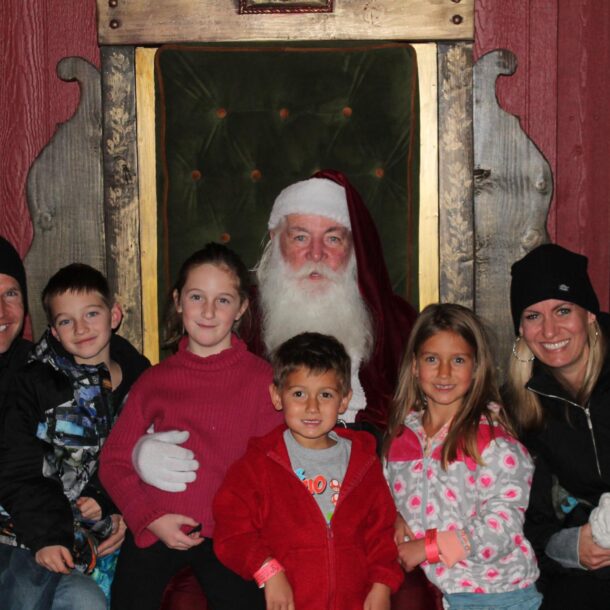
10 Ways You Can Help A Grieving Solo Parent This Holiday Season
I became a solo parent in the blink of an eye on a cool October morning. I woke up as a family of four and went to bed that night, a mother of two, very young children who had a dead Dad.
The shift in personal reality is beyond startling; it’s life-altering, dark, all consuming, and throws your body into a state of shock that can only be described as completely out of body and alien.
Our loss came just two months before Christmas, and my children were only one and two the day of his death. As a parent who is grieving, you experience the deepest “mama” or “papa” bear emotions. You fiercely want to protect these little beings, you want to make them happy, give their life everything you had initially dreamed, but in the middle of your dream, it all became a nightmare. Being a solo parent often means you aren’t given the opportunity to grieve the spouse and the life you just lost; you are too busy worrying about the littlest people you are solely responsible for keeping safe.
New grief emotions can range from numb to emotionally devastated and everything in between. There is no right or wrong emotion, no correct way to be or seem, and no outsider looking in can ever understand the depth of the loss and the emptiness in the lives left behind.
That being said, there are a few things you can do this holiday season to lessen the pain and bring even the smallest amount of joy to a family that is grieving. Understand the surviving spouse is doing it ALL ALONE. There are no weekends off, no respite from the storm, no reprieve to allow for grief. By doing small things, you may be giving your friend or family member the most significant gift of all this holiday season, a chance to grieve, see their children happy, and a small break from being everything to these little lives who have just lost so much.
My list is not all-inclusive; there are so many things you can do, but understand this is a great start, and if everyone did just one, it could brighten the lives of a family that just lost so much.
10 Tips
- Understand why they don’t want to celebrate
The grieving spouse may not feel like celebrating at all. Don’t judge their feelings, and don’t force them to be or look happy. For me, there was never a question that I wanted my children to celebrate and create memories; I didn’t want to at first. Finding joy again takes time, and being told you need to look or be different is painful. Allow them to be where they are without criticism or a feeling of inadequacy.
- Don’t push new memories too quickly
I’m ten years beyond our loss now, and I love creating new memories with my children and my husband Keith (I remarried about five years after my loss). Wanting to create new family memories takes time. For now, allow them to relive the old memories again and again. Don’t tell them it’s wrong to walk down memory lane and don’t ask them to forget. Death turns life upside down; their past will forever be part of who they are and the future they create. Give it time, let them be.
- Decorate for them
With every fiber of my being, I wanted my children to enjoy the “magic” of Christmas that first year, but I didn’t have the energy or the emotional well-being to create anything magical. Some amazing, wise, and well-meaning friends came to my house, decorated the tree, the exterior, and even baked cookies with my children. They played Christmas music and “brought” the magic, so I didn’t have to do it. It was one of the kindest things anyone has ever done for me post loss, and I am forever thankful my children had a little bit of holiday magic that day, even if I was emotionally detached from the situation.
- Help give the children a magical holiday without pushing it on the parent
My next tip is similar to #3. I want to encourage you to take the children out to sled, see Santa (if the parent doesn’t mind), have a holiday EXPERIENCE with or without the surviving parent. Clearly, every individual is different but gage the parent’s feelings and help the children find joy. Seeing my kids smile made me smile, and I was so happy not to have to think of something to do or ways to entertain them.
- Watch their kids
Being ALONE after my late husband died was one of the greatest gifts I was ever given. Encourage your friend or family member to do something for themselves. Maybe they need to sit in their room and cry, or perhaps they just desperately need a good massage. You can’t underestimate how vital things like movement and massage are for the grieving body. It’s not only our mental state that suffers, but grief is also a full-body experience, and when you are raising children as a now solo parent, you do it all. Give them the gift of being alone and allowing for self-care.
- Play secret Santa
That first year I didn’t have it in me to shop. My children were very young, so thankfully, shopping wasn’t all that necessary, but just being out with “normal” people who’s lives just hadn’t been shattered was painful. Maybe get a list and help them with the shopping and wrapping. Remind them that what was taken can never be replaced with things, but understanding seeing the joy in children’s faces as they open a few gifts can feel good.
- Take them to a funny movie
Something we assume our grieving friend won’t want to laugh or even go out, and sometimes that is a correct assumption, but you can’t know unless you ask. Don’t forget your grieving friends this holiday. Ask them to join you, or show up at their home with a funny movie and sit down and watch with them. I loved laughing after my loss with my closest friends. They didn’t judge me for laughing, and they realized it didn’t mean I wasn’t devastated, I just needed a break from my pain. Sometimes the burden of being in “grief” can be exhausting, especially for the person doing it.
- Don’t judge what they do with their free moments
If you are kind enough to go and be with the children so mom or dad can get some alone time, please do not judge what they do with that time. Maybe being “touched” via a massage is the most cathartic thing they can do. Perhaps a pedicure allows them some time to chill and even process. Maybe a hard run gives them endorphins and peace. Please let them be where they are and grieve in a way that works for them. Trust me, self-care is critical to a widowed parent, don’t assume you’d do “better” just because you THINK you would do it differently.
- Just sit and talk to them
Be a friend. Talk to them, about whatever THEY want to talk about for as long as necessary. Grieving can appear to be very selfish to the person who isn’t living the day to day process. Those who are grieving can appear to be consumed with their own pain, process, and challenges. That’s okay, let them be where they are and offer an ear for more than a few weeks/months post-loss.
- Believe them when they see signs
Christmas Eve the year Mitch died, I found an old Christmas card under our tree from Mitch, propped up against the back wall behind our tree. I burst into tears. It made me so happy. I believed then, and I still believe today that it was a sign, his way of saying, “Merry Christmas” and sharing his love with his family. Believe them when they see signs when they feel their presence when we know they are near. It’s a critical part of healing to believe your loved one is okay. Let them have that belief; it’s one of the biggest and easiest gifts you can ever give.
- Say their name
This is EVERYTHING. Keep them alive by telling their stories, sharing their love and light. Nobody truly dies until you stop saying their name.
If you are still reading and you plan to help someone this holiday season by putting just a few of these tips into action, thank you. It’s people like you who make all the difference when we need it most. Be kind, show grace and patience, and someday, when your time comes to grieve, we will return the favor.
Finally, many of these tips also help the grieving people who don’t have children, listen and be open to supporting the way they need it help.
Read more from Michelle in her new best selling book, Healthy Healing. www.healthyhealingbook.com


